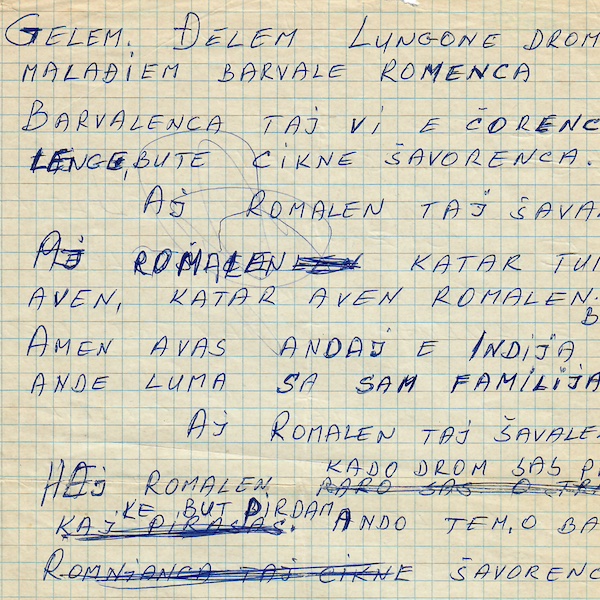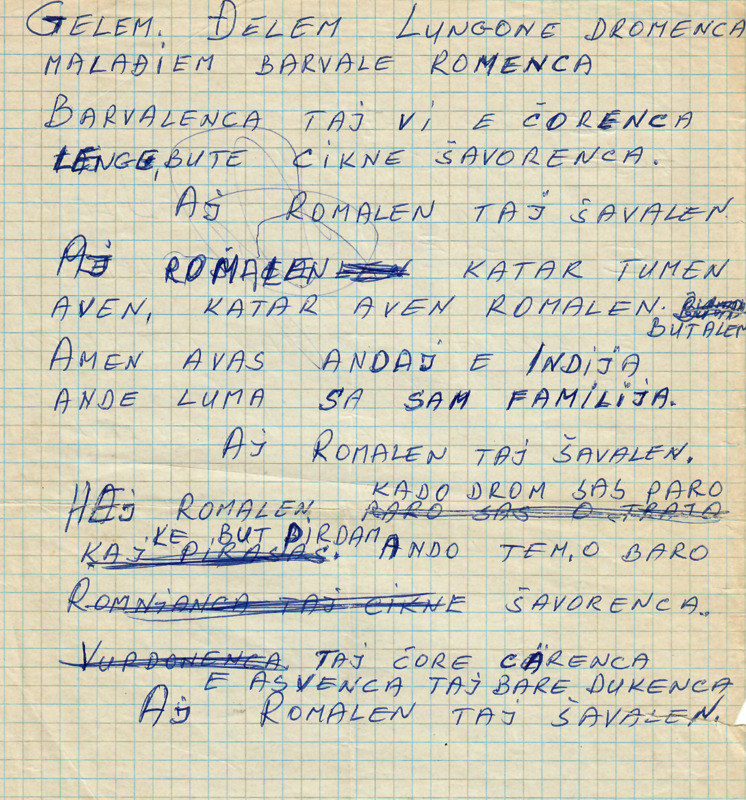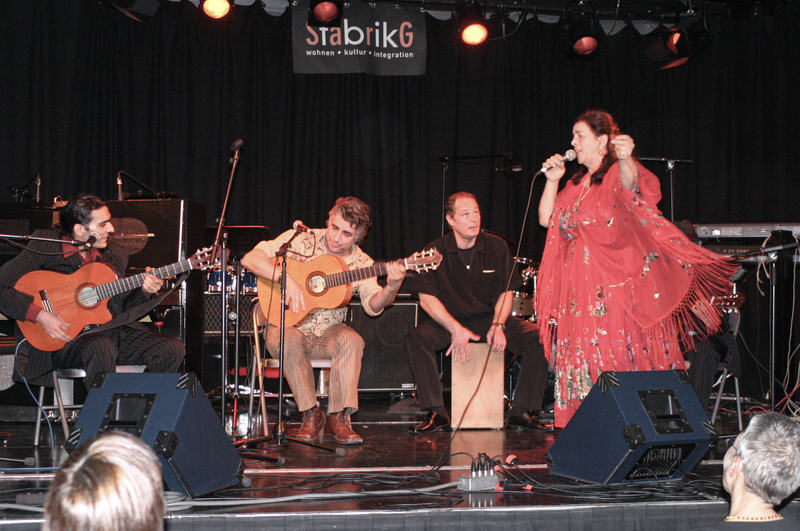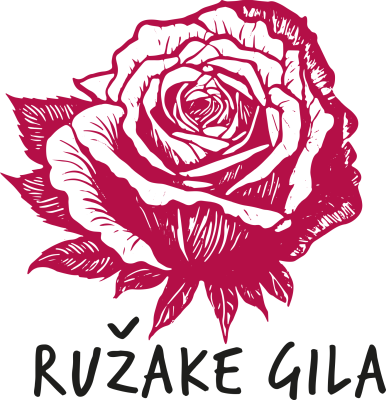
Gelem, gelem
- Genre
- neues Lied
- Thema
- politisches Lied
- DOI
- doi.org/10.21939/4fca-av70
Content
Recordings
Ruža Nikolić-Lakatos und The Gypsy Family perform the Romani anthem Gelem, gelem during a performance at the Gypsy Festival in Mitterdorf in 1997.
musical transcription
Originally popular in the former Yugoslavia (especially through the film Skupljači perja from 1967), Gelem, gelem was declared the anthem of the Roma at the first World Congress of the later International Romani Union in 1971. The song has since become a political symbol of the Romani movement and can be heard at every official event in Austria.
Petra Gelbart sees the Romani anthem in its various versions as a “microcosm of diversity”.
In the publication Die andere Hymne, ethnomusicologist Ursula Hemtek describes Gelem, gelem as “the international anthem of the ‘traveling’ people”, pointing out contradictions in the traditional understanding of anthems: To what extent can an anthem that is supposed to be the symbol of a nation be international, and how can a people that has no territory be a nation? The Romani anthem Gelem, gelem can, however, be understood as such when common identity, history and future are foregrounded. Gelem, gelem does not only exist in one version but in many different versions and is sung by Roma all over the world. As such, the song can be understood as an anthem of diversity.
Ruža Nikolić-Lakatos sings Gelem, gelem in the vocal style of the Lovara. The basic melody hardly differs from other versions of the anthem, but she sings her husband Mišo Nikolić's version of the lyrics. This is relevant as it refers to the history of the Roma and their Indian origins. The anthem was often a starting point for joint music-making with other ensembles of the ethnic group, for example with Pera Petrović and Pišti Horvath.
Source and further literature:
- Hemetek, Ursula. (Ed.) Die andere Hymne. Minderheitenstimmen aus Österreich. Vienna: Österreichische Dialektautoren, 2006. p.73.
- Gelbart, Petra. "The Romani anthem as a microcosm of diversity.” RomArchive – Digital Archive of the Roma. Accessed on 12.03.2024. Link
Mišo Nikolić demonstrates Gelem, gelem with his version of the lyrics. In the background, Ruža Nikolić-Lakatos sings along to the refrain. The recording was made in 1993 during a field research interview in the Nikolić family home.
Ruža Nikolić-Lakatos performs the Romani anthem Gelem, gelem together with the ensemble Pera Petrović as part of the event series Roma -Mythos und Wirklichkeit at the Interkulttheater 1994. The text version is that of her husband Mišo Nikolić. The ensemble Pera Petrović represents a Roma music style from Vojvodina (region in Serbia) with violin and tamburica instruments. The two different musical styles come together in the Romani anthem.
During a performance at the Interkulttheater in 1994, Ruža Nikolić-Lakatos sings Gelem, gelem ccompanied by the ensemble Pišti Horvath.
This is a modernized version of Gelem, gelem, which Ruža Nikolić-Lakatos and The Gypsy Family released on their CD with the same name.
Lyrics
Stanza 1
| Gelem, gelem lungone dromenca, | I have walked long paths |
| maladjilem e bute Romenca, | and met many Roma. |
| barvalenca taj vi e čorenca | Rich and poor I have met |
| taj vi longe xurde šavorenca. | and also their small children. |
Refrain
| Aj, Romalen, aj šavalen! | Oh Roma, oh friends! |
Stanza 2
| Aj Romalen, katar tumen aven? | Roma, where do you come from? |
| Katar aven, Romale butale? | Where do so many of you come from? |
| Amen avas anda e Indija, | We are from India |
| sa e Rom sam sar jek familija. | We Roma are all like a family. |
Refrain
| Aj, Romalen, aj šavalen! | Oh Roma, oh friends! |
Stanza 3
| Aj Romalen, kado drom sas pharo | Oh Roma, it has been a hard road |
| kaj phirasas ando them o baro. | that we have walked in this wide world. |
| Vurdonenca taj čore cerhenca | With wagons and with poor tents, |
| e asvenca taj bare dukhenca. | with tears and great pain. |
Refrain
| Aj, Romalen, aj šavalen! | Oh Roma, oh friends! |
Manuscript by Mišo Nikolić
Videos
Ruža Nikolić-Lakatos sings Gelem, gelem as part of the event Die andere Hymne at the Sargfabrik 2005.
Excerpt from the television report on the Roma anthem produced by Minet – Das Minderheitenmagazin. Ruža Nikolić-Lakatos plays music with her son Mischa Nikolić at the family home. Ethnomusicologist Ursula Hemetek explains her approach to researching the anthem.
Photo
© Petar Tyran (2005)
Gelem, gelem at Sargfabrik
Zitierempfehlung anzeigen
Bitte zitieren Sie diese Seite wie folgt:
Music and Minorities Research Center, "Gelem, gelem", Ružake gila, zuletzt besucht am Loading date..., doi.org/10.21939/4fca-av70




